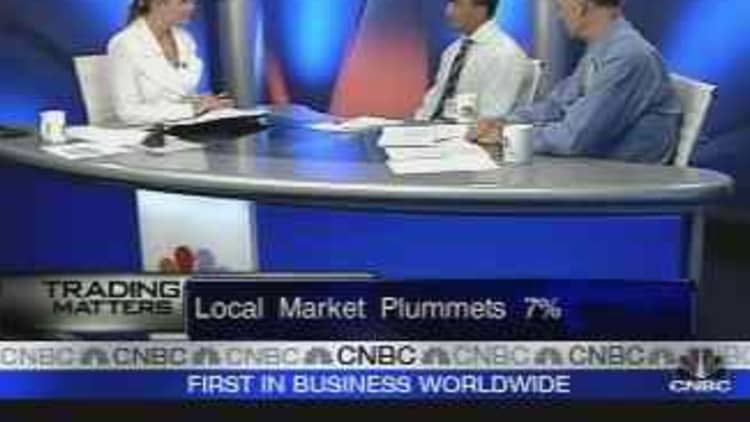Global markets were roiled as fears of a recession gripped investors. U.S. stock futures were factoring in a steep loss until the Federal Reverse announced a surprise cut in key interest rates. The 75 basis point cut led U.S. stocks to pare their losses.
In these turbulent times, here's what the experts are saying:
"The stimulus package is a joke. That type of stimulus doesn't get spent in the areas it should get spent, it gets saved, so it's very good for the politician to say, 'See what I've done?' but what you really need now is a significant interest rate cut by the Fed, 75 basis points, but on top of that, you really need, I think, for the market to have that sickening decline, and then maybe some stabilization."
— Vince Farrell, Scotsman Capital Management Managing Director

"This is a digital world, and you've got an analog Fed right now, that is taking their time, trying to digest what's going on. They've got to move at light speed. This market is moving quickly, and they have to move."
— Jack Bouroudjian, Brewer Investment Group
"The last thing the U.S. can afford is an extended severe recession. We have to go all-out with monetary stimulus and fiscal stimulus in order to avoid such an eventuality."
— John Lonski, Moody's Investor Service
"I don't think the Federal Reserve, nor the U.S. Treasury or the federal government can do much to change what we need to go through, and that is, a two-year cycle of housing and credit-market corrections, painful as that might be, along with a slump in the U.S. economy that will lead to more global difficulties in the course of the next nine to 12 months."
— Joe Battipaglia, Stifel Nicolaus Private Client Market Strategist
"The stock market's a symptom of a much, much bigger credit market crisis. $750 trillion in credit derivatives outstanding around the world, versus $50 trillion in global GDP. As the credit market continues to melt down, you have a separate set of problems away from the stock market.
"The Fed, as we've been saying for quite a long time, since last June, is wildly behind the curve. There's been this stopping and starting in policy. There have been head fakes about what they think is going on in the economy. That's happened at Treasury as well. It's not the type of single-voice, unified leadership you need during a period like this, and I think it's why we're having deeper problems than we would have had otherwise."
— Ron Insana, Insana Capital Partners Managing Director (private equity reaction)
"On the one hand, they're going to do more deals, you know, not today, not tomorrow, they're going to let this play out a bit, but private equity traditionally before 2006 and 2007, liked to buy sectors that were doing badly. The issue is, last year, there weren't very many of those. There are going to be again.
"If you have this big global sell-off, do the corporations — there's been so much talk that corporate America has tons of cash on hand, so they'll be able to do all this acquiring. If the cash on hand goes down, and clearly, IPOs aren't the way you're going to go, where are the private equity firms going to exit, outside of to each other, but it's ultimately a shell game."
— Dan Primack, PEHub.com Editor
"Venture capitalists, as you know, are very long-term investors. Where we see concerns is in the exit market. Where are we going to put these (emerging growth) companies? Are they going to be able to get acquired, and ate they going to be able to go public?"
-Mark Heesen, National Venture Capital Association President
"It's going to be a very, very violent first couple of hours, but we're not down a whole another session like everyone else. We were in front of this, and the rest of the world is, in fact, catching up to us, even though we were closed."
— Kevin Ferry, Cronus Futures Management Chief Market Strategist

